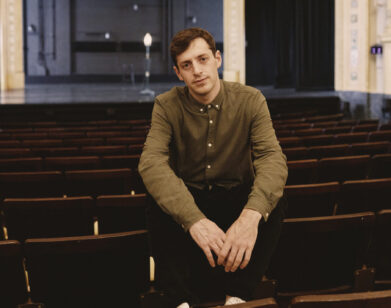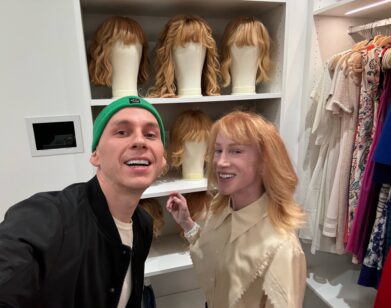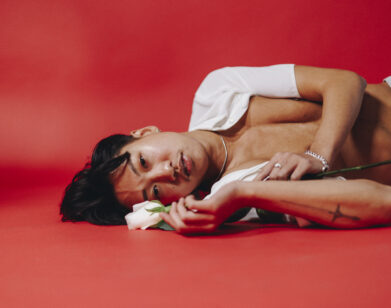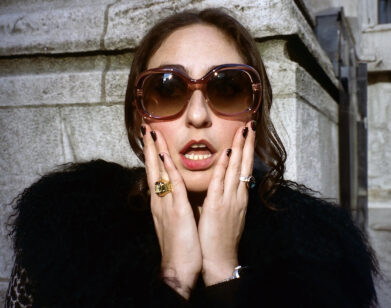clowning around
Amy Poehler and Natalie Palamides on Finding the Comedy in Consent
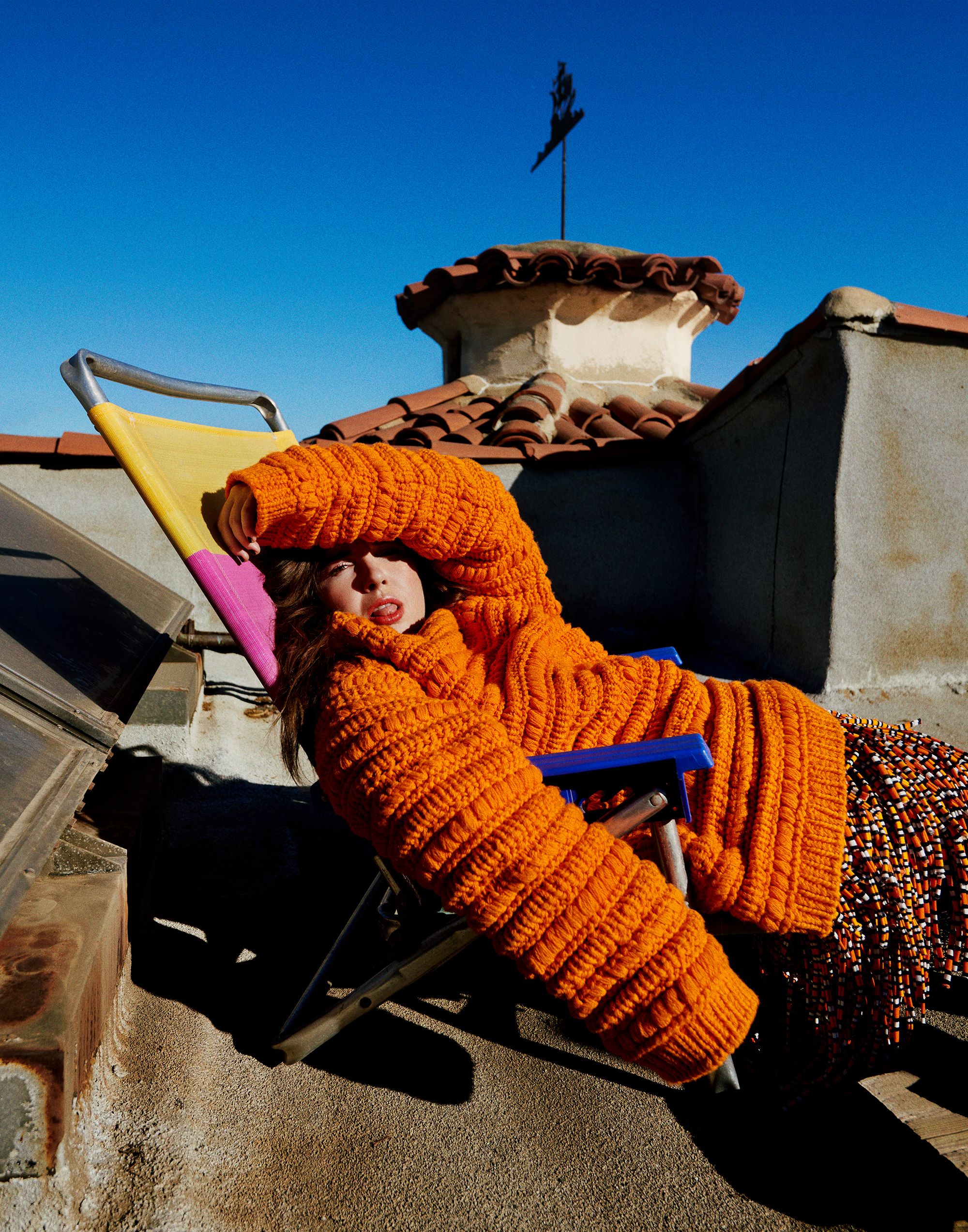
Natalie Palamides stands center stage under a showerhead. She’s topless and soaking, whimpering beneath a black Lorax mustache, clumps of glued-on chest hair trickling down her chest. She pauses and cocks her hip, modeling her oversized strap-on while morosely staring off into the distance, a petite statue of David with a loofah for a fig leaf. Of course, this isn’t really Natalie; this is Nate, the titular tortured douchebro at the center of her one-man show, now on Netflix. Produced by Amy Poehler, who became aware of Palamides from her performances at the Upright Citizens’ Brigade, Nate is an hour-long experiment in pushing the audience to its most queasy edge, playing with gender in ways that somehow still feel uncharted. Almost entirely naked throughout the show, Nate chugs La Croix, asks to touch an audience member’s breasts (second time’s the charm), and challenges another to an on-stage wrestling match. A date with a mannequin has Nate pleading the audience for help around defining consent, and their answers are uncertain. It’s a poignant, albeit shamelessly absurd, look into the psyche of a man navigating the debris of 2017’s #MeToo tidal wave, and those of everyone watching him.
Palamides is well-trained in the art of absurdity, with a background in drag, improv, and clowning. Nate is her follow-up to 2017’s Laid, about a woman who gives birth to an egg, for which she won the Best Newcomer Award at the Edinburgh Film Festival. The costume she used was repurposed from an earlier UCB sketch in which she played an anthropomorphic egg who would like to speak to the manager of the L.A.-based chain and food porn vehicle Eggslut. While her work is decidedly provocative, it’s only a couple degrees more absurd than this absurd world. And for Palamides, as she tells Poehler on a mid-afternoon Zoom call, that’s part of the job.—SARAH NECHAMKIN
———
NATALIE PALAMIDES: Amy, hey!
AMY POEHLER: Hi, Nat! This is exciting. We’re doing this for Interview magazine. You’re nervous.
PALAMIDES: I’m nervous.
POEHLER: Well, I wish they would start this interview like, “She walked into the restaurant and took off her cardigan sweater, her bare shoulders glistened in the sunlight. She ordered poached salmon and the waiter was enthralled.”
PALAMIDES: I wish that was more the energy as well.
POEHLER: It’s hard to distill Nate into a few sentences, but how would you describe the character to someone who knew nothing about the show?
PALAMIDES: I would probably describe Nate as a macho douchebag with a heart of gold. He’s plagued with toxic masculinity, but is always trying to do better and always failing. That’s the idiot inside of him. And I think that’s why we can laugh at him, because he’s so deeply complicated by what he’s been taught about how a man should act, but still his heart of gold is always seeping through. And you can see that he’s really earnestly trying to be good.
POEHLER: Let’s go back in time to how you first started playing that character. Where did he come from?
PALAMIDES: He first popped out when I was doing a drag workshop with a theater company in Philadelphia called the Pig Iron Theater Company about eight years ago. I was doing a bunch of men, and Nate was just one of the characters that I drummed up. The first piece I did with him was five minutes, all silence. It was the vibe of a lonely bachelor pad. He’s just sitting there watching TV, sullenly chugging this two-liter bottle of soda, and he’s really sad, but you can see that he’s having trouble being vulnerable. He’s this really macho dude chugging a bottle of soda who is really sad. And then he keeps burping. Every once in a while, he burps. He chugged the whole bottle in five minutes.
From there, I just had him in my back pocket. I would pull him out in sketches with my friends at UCB or in my clown group, Little Red Feathers. We made a little video with Nate who I call baby Nate because he didn’t have a mustache. Back then I just kind of put some stubble on and I actually cut black hair off of a wig and glued it to the side of my face for sideburns. Now I just use mascara instead. It’s much simpler, much easier to clean up. After I got back from doing my first Edinburgh, a bunch of stuff was coming up about toxic masculinity in the zeitgeist. And I thought Nate would be a good vehicle to explore a show about toxic masculinity. Honestly, I was scared about exploring the gray area of consent at first, and I kind of shied away from it. But at the time, in 2017, so much of the #MeToo movement was coming up. I was like, “I can’t do a show about toxic masculinity and not explore consent.”
POEHLER: You just explained what’s so beautifully complex about the show. There are these really big physical, clowning, slapstick, humorous moments, on top of a very deep message underneath, which is unpacking consent. You’re really comfortable with making yourself and other people uncomfortable. How do you see this as furthering the conversation about consent?
PALAMIDES: I think in that way where I’m making myself uncomfortable, as well as the audience, it’s all fair game. We’re in this room experiencing this situation together. And my goal in making everybody uncomfortable is to rip off the Band-Aid of talking about consent. I feel like so much of the discourse about consent happens online because people are uncomfortable addressing it face-to-face. They don’t want to hurt their friend’s feelings, they don’t want their friend to think badly of them. And I think that bringing it into the theater, bringing it into a room, into a situation where we can’t escape talking about it with each other—even though it feels uncomfortable, we need to get over that bridge before we can start having productive conversations about the gray area of consent. What we’re lacking online in the discourse is empathy. There’s a point in the show where Nate asks everybody a question and he waits for a response. And I see people who came together and the audience give different responses to that question, but they still leave the show friends. And a lot of them report back to me after coming to the show a second time, or seeing me out around town saying, “I had a conversation about the show and it helped my friend and I come to a better understanding of consent and masculinity.” I think many conversations about all sensitive issues would go in a much better, more productive direction if we looked at each other when we’re saying it.
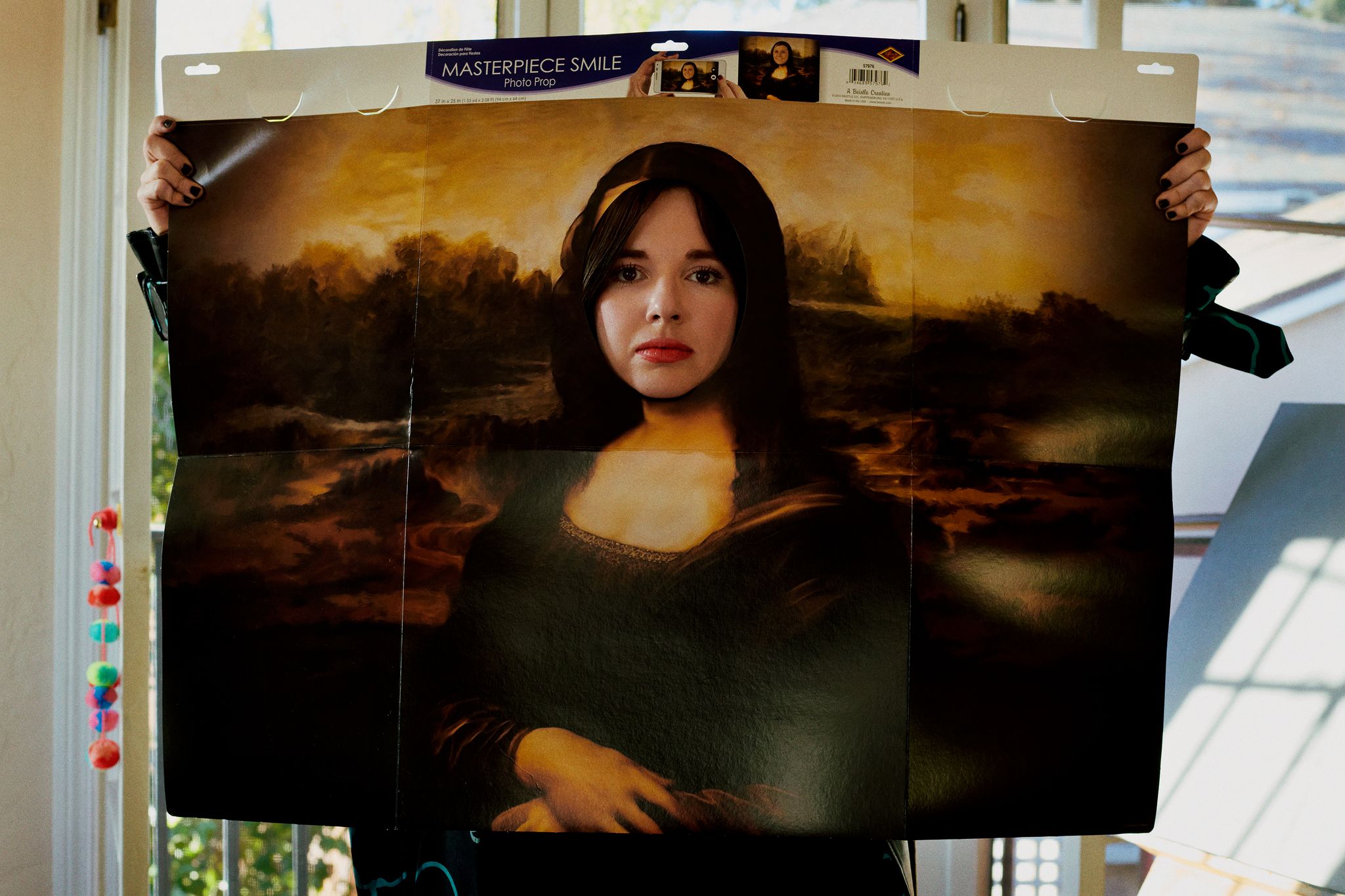
POEHLER: That’s so good. What’s so exciting about the show is you’re watching the struggle of a person trying to learn in real time. And that’s also very funny. In this case, it’s Nate trying to figure out how he can be “better,” but also he’s limited. So what you fall into is all this kind of physical action to show how he’s feeling, because he’s no poet.
PALAMIDES: He’s not.
POEHLER: So what did you have to do? I keep talking about you as if you were an athlete, but watching you perform night after night, you have to really put it on the line. What do you change physically to get into Nate, night after night?
PALAMIDES: You just get in shape as if you’re working out every day. I definitely did train. I wanted to be looking maybe a little bit ripped. I was doing intermittent fasting. I had worked with my friend, Chad Damiani. After the special I stopped weight training with him, but I missed being really strong. It’s just a fun tool to use in physical comedy, having strength that nobody expects from a person of small stature.
POEHLER: Yes.
PALAMIDES: My younger brother grew up wrestling, and he would always pay me in packs of gum to try out new wrestling moves on me. And so I kind of had a little bit of wrestling training.
POEHLER: You do wrestle audience members in one scene. It’s Andy Kaufman-esque in the way that you put yourself forward. But what’s so fascinating is the man that you’re wrestling with is often much more seemingly vulnerable than you are. It’s really fascinating to watch them have to figure out. Because you’re there to wrestle. You’re not there to fuck around.
PALAMIDES: That’s right.
POEHLER: They learn that really fast. Do people sometimes really come at you?
PALAMIDES: Yeah. I try to sense that in them, whether they really want to wrestle me or if they’re a bit hesitant—then I do a little bit of staged combat. But, a couple of times, especially in Edinburgh, when people are drinking, a few people get a bit rough and I just have to take a step back and be like, “Whoa, this is a show.” It’s me, Natalie. Hello.
POEHLER: You’re talking about being in staged combat training, and we mentioned a little bit in your clown training. I feel like clowning as an art is very misunderstood. Improv can sometimes fall into that category, too. It’s kind of discarded by the cool kids, because it takes a lot of commitment, a certain amount of vulnerability and earnestness.
PALAMIDES: I think clown and improv similarly can get a bad rap for being hokey. That’s what I bump up against a lot. On TV shows you’ll see like the hokey college improv team and people making fun of improvisers and wearing the plaid shirt uniform, and same with clowning. People just automatically assume it’s a bad birthday clown that squirts water at your face and does bad tricks with streamers and stuff. What I like to reference for the clown are the Three Stooges and Lucille Ball. Carol Burnett’s a great clown, Steve Martin, Mr. Bean. There’s all these modern day clowns that people don’t realize are clowns because they don’t have the red nose. People don’t recognize that the clown is just physical comedy.
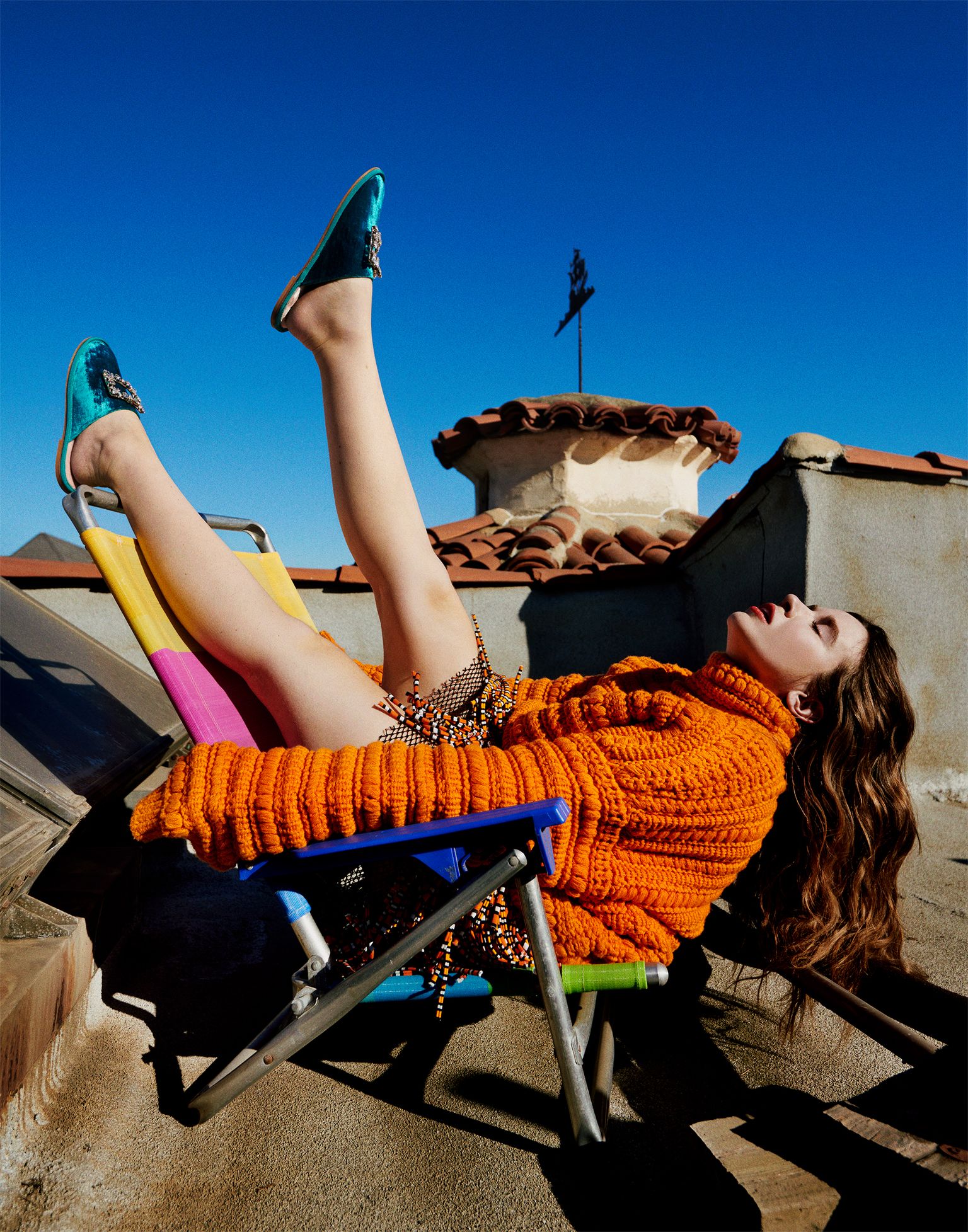
Sweater and skirt by Christian Wijnants. Slides by Roger Vivier.
POEHLER: Do you know Sebastian Maniscalco? He moves in a way that’s completely clown based. Katt Williams used to have that too, in the sense that his body is yet another joke and it’s so satisfying to watch. Who are your influences? Artists, musicians, dancers, TikTokers. Is there anyone you see right now that you really dig how they move?
PALAMIDES: This is maybe a really obscure influence, but there was this man named Charles Ludlam, who was really famous in the eighties for remounting classical plays, but performing them in drag and being super campy, but still being able to move people to tears. He passed from AIDS in the eighties. I also love the PEN15 girls. I think an element to what they do is clowning because part of clowning is being the child, and they play the innocent child so well to the point where you don’t even recognize that they’re 30-year-old women. And it’s such a beautiful, pure spirit that they produce.
POEHLER: I like a lot of TikTok dancers. There’s this guy Tristan Rubiano that I think is amazing. But also Jack Black. I love how Jack moves.
PALAMIDES: He’s a clown.
POEHLER: He’s a total clown. He’s so funny and precise. There’s just so many levels of talent—I’m always so impressed.
PALAMIDES: That’s such a good example. I’m racking my brain right now. Of course I’ll think of 50 people after we hang up.
POEHLER: You can email Carol Interview, the woman that owns Interview Magazine. It’s [email protected].
PALAMIDES: Great. Awesome.
POEHLER: There’s a lot of absurdity in the show, balanced with these really deep and thoughtful in-the-moment moments. Our world is so absurd right now, you couldn’t have dreamed how absurd it is. How do you think absurdity can be used in an absurd world?
PALAMIDES: As artists, I think we’re challenged to be more absurd than this absurd world. So you’ve just got to let your freak flag fly and you got to pull out all the stops when it comes to absurdity. Because like you said, the world is a crazy place right now. So on stage you got to be even crazier. And then I think using absurdity as this tool to take out of the emotion that they might feel and bring them to a place where they can have an open mind about it. I think creating comedy and absurdity around sensitive issues allows people to take a step back to a place where they can look at it more objectively. To think about it more, more critically, and not just from a place of emotion. Emotion is important, of course, but sometimes it clouds our ability to have a reasonable discourse.
POEHLER: Speaking of discourse, now we’re in a time where gender is so fluid and masculinity is changing, and it’s so great. Because Nate is in the middle of the change. He’s this guy who realizes, “Okay, things are different and I need to get in touch with my feelings. How does one do that?” And in the news now, Harry Styles is on the cover of Vogue.
PALAMIDES: Good for him.
POEHLER: And he’s beautiful wearing dresses. And then Natalie is playing Nate, who’s this kind of man trapped in a body that might not feel like his. There’s a long history of men playing women, and I just think it’s really interesting to see women play men. What could we learn about ourselves and about men and women when we watch somebody take on that character? That’s what I really love about how you play Nate.
PALAMIDES: Yeah. And that’s what’s fun about using drag as this tool. Historically drag has been used to poke fun at gender roles. We see a lot of men playing women in drag, and I think it’s good that now we’re seeing more drag kings out on the scene. I like exploring Nate’s insecurity about expressing more feminine qualities like vulnerability and just having emotions in general. It’s so funny that we perceive the hiding of emotions as something that’s masculine. That’s just a person with some unhealthy ways to deal with their feelings. That doesn’t make someone masculine.
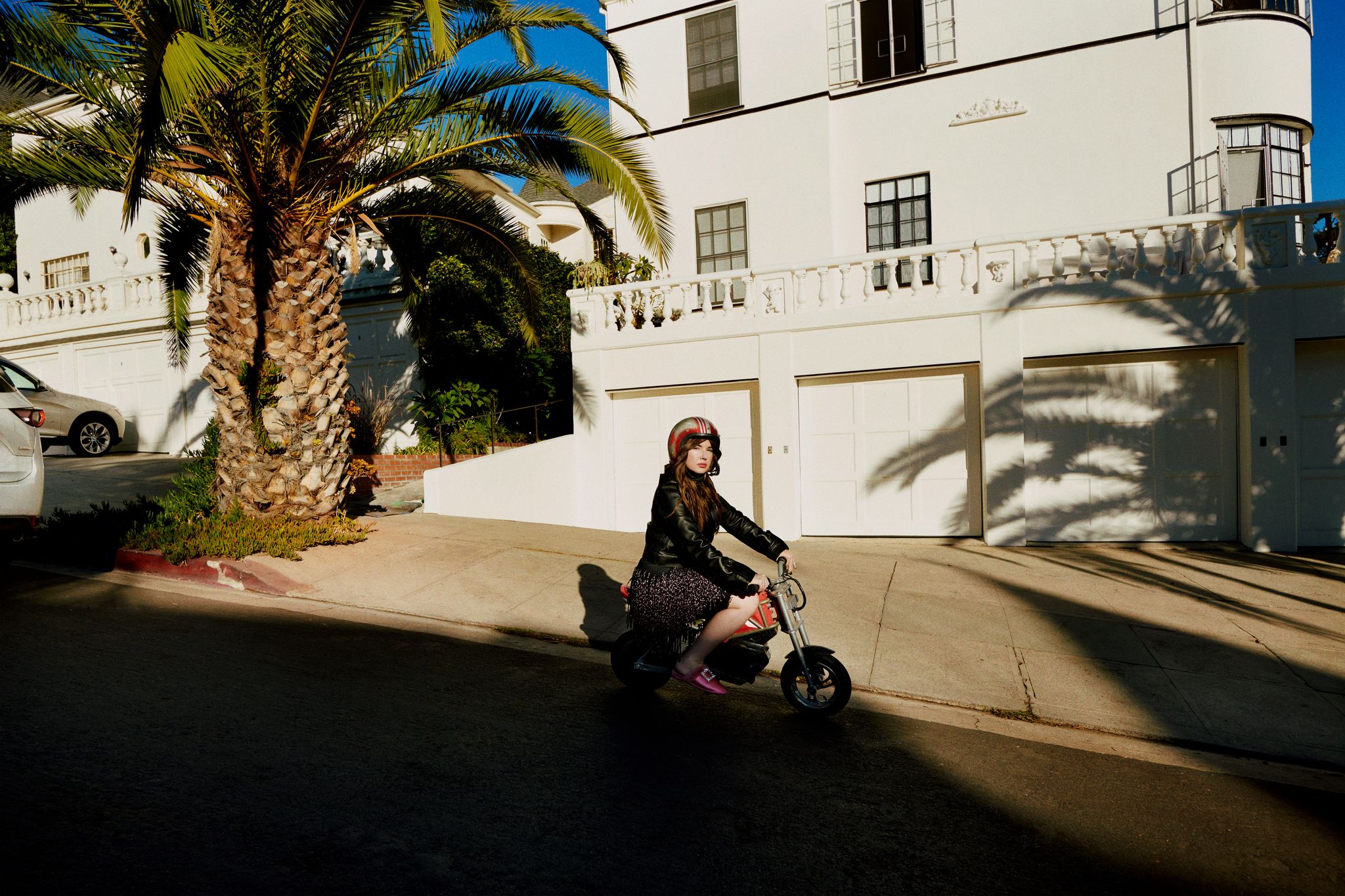
Jacket by Amiri. Skirt by Christian Wijnants. Slides by Roger Vivier.
POEHLER: It’s an old story. How do you think Nate would be handling quarantine?
PALAMIDES: Well, little pieces of Nate come from the men who I love in my life, and when you mention Nate and quarantine, I think about my brother, who I quarantined with for a month.
POEHLER: Wow.
PALAMIDES: He signed up for the Navy and his ship out date was pushed when COVID started, and he had already gotten rid of his apartment in San Francisco. And so we were quarantined together for a month while he was looking for a place, but every part of the day he was working out. Anytime I rounded the corner, he had a chain strapped to his head that was like strapped to something heavy and he’s lifting it up. And then he would have a case of beer at night and watch National Geographic. My brother loves to paint too. They have that in common. My brother would either be working out, eating or watching Bob Ross and trying to do a painting. I imagine Nate doing something a bit similar.
POEHLER: So, if you like to laugh and then you like to all of a sudden turn the corner and really be encouraged to think deep stuff, then Nate is a special for you because you’re going to laugh really hard. And then a second later you’re going to be like, “Whoa, how do I feel about this?” And that’s what’s so interesting about your work, Natalie, is how deep you’re willing to go and how funny you are. Those two things don’t always coexist.
———
Hair: Matthew Collins
Makeup: Loren Canby


